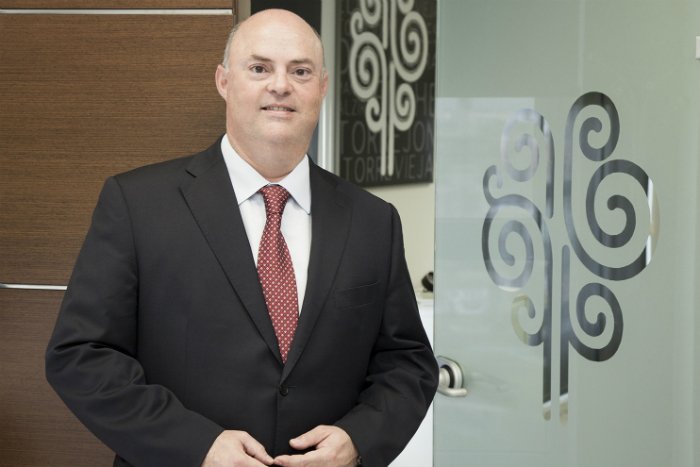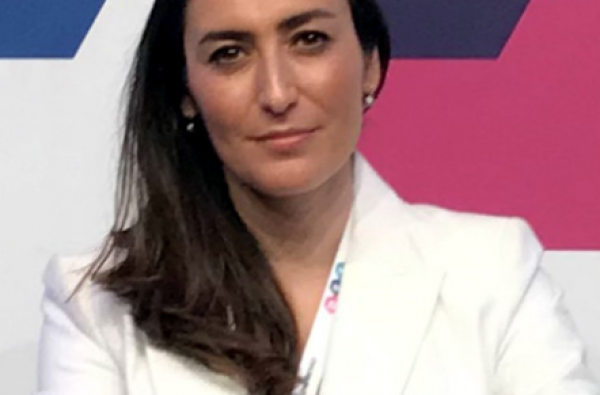Beyond genetics, the CEO of Ribera Salud, Alberto de Rosa, believes that health is a matter of prevention. Defender of innovation, criticizes the fact that the health sector is not progressing fast enough and bets on a collaborative model in which the citizen assumes more responsibility.
"In the future there will be a shortage of doctors", warns the CEO of the health management group Ribera Salud, Alberto de Rosa. In his opinion, the healthcare sector in Spain must prepare for this possible situation and innovate urgently so that hospital care does not become obsolete. He believes that public institutions need to modernise and evolve in line with today's changing societies, in which even diseases are different from those of the past.
De Rosa is sure that technology will build a more agile and closer health system, with smaller hospitals and shorter incomes. But to do so, she says society also has work to do. She believes a cultural change is necessary to reduce the reluctance of some people to live with more technological medical care and to become active agents in maintaining their own health.
One of the 10 Emerging Technologies that MIT Technology Review has selected in 2018 is massive genetic studies, capable of finding common traits in people's DNA to predict possible diseases. How do you evaluate this new technology?
I have no doubt that these technologies will transform healthcare as we know it today. If I think of the hospitals of the future, I can no longer imagine those large centres with 1,000 beds, but small hospitals, with few beds, but with a lot of technology. The ICUs [Intensive Care Units] will be bigger because we will be able to intervene with more and more people. In addition, we will have more agile processes and people will spend less and less time there because, thanks to technology, the citizen will be able to have from home an almost individualized attention of doctors or nurses through telemedicine tools.
This is the model we are moving towards, and its main barrier is cultural. We still start from a traditional concept in which we associate health as a somewhat static sector, but when we are able to internalize that technology is going to give us much more immediate solutions, we will get closer and closer to those hospitals of the future.
What do you think of the application of big data and artificial intelligence both in science and business management?
I am convinced that big data and increased intelligence (I prefer to call it that) will help the sector a lot. But we cannot ignore the fact that we still face great challenges: we must work to make information confidential and have a clear idea of how it is used. And, above all, we cannot lose the central focus, which is to make all this organised information available to citizens and their carers so that both can assume part of the responsibility for their personal care.
Unfortunately, I believe that the health system is still not very innovative, it still has a long way to go. It must be much more permeable to the citizen, more agile and flexible in the face of the challenges of technological innovation opened up by changing societies.
What value are new technologies bringing to your business? And to users?
The disease, in the end, is a failure for the system. It is true that it is a matter of nature, but we must also live it as a failure of the system in which we have to work with the citizen to try to extend as much as possible their state of well-being and health. Many factors in the sector are changing: health, society and even diseases themselves. People today live much longer, they have chronic illnesses that require a long period of relationship with the health system and, deep down, as long as there is no great disadvantage, there is no need to go to the doctor in person. Technology can, therefore, allow the health system to be more agile, closer and more responsive.
One of the initiatives to nurture this collaborative work was our health portal, designed so that citizens could participate in the management of their own illness. Thanks to this platform, which is already used by more than 50% of our patients, they can communicate directly with their nurse or doctor.
In this exercise of empowering the citizen, technology is the lever for change, the one that brings health closer to each individual. And this is not science fiction, medicine based on the "5P" is already a reality: population, predictive, preventive, proactive and personalized. Today we all have health in our pockets because the mobile phone is a first-rate health tool that always accompanies us.
These new technologies are favouring the entry of companies outside the sector that have detected new business opportunities. For example, Amazon has launched itself into the market through a joint venture with JPMorgan and Berkshire Hathaway. How are you preparing for these new competitors?
Our first reaction is one of surprise. The second is to stop to analyze the reasons that move these companies to enter a sector that, a priori, is alien to them and study the value they can bring to health.
We are often mistaken in thinking that we are more experts in a subject because we have been in a sector for many years. Today the rules of the game have changed, it is precisely technology that is breaking those schemes and traditional barriers that existed before. That's why it shouldn't seem so strange for outside companies to introduce their experience in other fields. These initiatives become interesting to the extent that they make large companies help to normalise these concepts of transformation and change in the public sector.
But we must not forget that this technological vision must always be hand in hand with the concept of humanization, closeness and warmth in the care of health professionals. The ideal case would come from the fusion of both visions, since the healthcare sector has been transforming on the surface for years, but not so many years of in-depth transformation.

According to OCSE, more than four million "digital employees" are expected to be missing from the labour market in the next five years. Is this trend already affecting your sector?
We are not yet noticing it, but it is true that in the health system we have to be prepared and be aware that in the future there will be a shortage of doctors, professionals related to technology and highly qualified jobs.
This is a problem in which the authorities must take sides and act at the pace required by this society in permanent transformation. And we, as organizations, must be able to attract and retain that talent. Our goal is to always be at the forefront of technology because, in order to retain the best talent, we have to bet on innovation and digital transformation.
Incorporating new teams and lines of work requires organizational change: accepting new risks, adopting the culture of error... How was this need to innovate transmitted to the Board of Directors and the organization?
Ribera Salud has a digital culture; we were born with innovation and with the use of technology in the use of the patient. We were, in fact, the first company within the Spanish public system to introduce electronic medical records.
For me, the concept of cultural transformation is fundamental in an organization. At first, people are reluctant to do different things, but when you get them involved and make them the protagonists of that process and they see that the effort to adapt to new methodologies facilitates their work and improves citizen service, then you get results. This creates a very positive inertia in the company in which creativity is added, agile and innovative environments that manage to keep the talent. We are committed to a culture of innovation that goes from the bottom up.
How are you, as CEO, facing the challenges posed by the digital transformation?
As CEO, I have been fortunate enough to lead a process of introducing technology into the healthcare system when there was no digital experience in the sector. If I go back 20 years, the most important role was to lead that internal cultural change in the face of the difficulties that arose from our status as pioneers. We had to encourage it and convey confidence to people that we were taking the right steps. And, even today, the challenge is still to know how to project with confidence that we are walking towards the future.
By Marta Sotres



